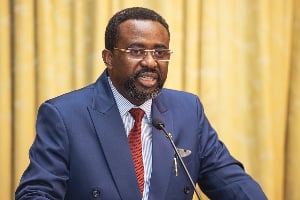Reimagining US-Africa Trade: A Paradigm Shift Towards Shared Prosperity
The prevailing narrative of US-Africa trade relations, often characterized by a lopsided exchange of raw materials for finished goods, needs a fundamental overhaul. Dr. Johnson Pandit Asiama, Governor of the Bank of Ghana, has articulated a compelling vision for a transformative partnership grounded in shared prosperity, strategic collaboration, and mutual respect. This vision moves beyond the traditional aid-centric model and embraces a more equitable and sustainable approach that recognizes Africa’s potential as a production and innovation hub. Dr. Asiama’s framework, presented at the African Leaders & Partners Forum, hinges on four interconnected pillars: macroeconomic credibility and strategic autonomy, financial system resilience and risk mitigation, trade integration and financing, and inclusive digital transformation. These pillars, he argues, are essential for unlocking Africa’s vast economic potential and fostering a truly mutually beneficial relationship with the United States.
Macroeconomic Stability and Strategic Autonomy: Laying the Foundation for Sustainable Growth
The cornerstone of Dr. Asiama’s vision is macroeconomic stability. This entails sound fiscal and monetary policies that create a predictable and conducive environment for investment and long-term economic growth. However, stability alone is insufficient. Africa must also assert its strategic autonomy, moving beyond its traditional role as a mere supplier of raw materials. This involves actively shaping its participation in global trade, positioning itself as a valued production partner, and prioritizing value-added industries that generate high-quality jobs and stimulate technological advancement. By embracing strategic autonomy, African nations can leverage their resources and human capital to build diversified and resilient economies, reducing their dependence on commodity exports and enhancing their bargaining power in global markets.
Financial System Resilience and Risk Mitigation: Building Trust and Fostering Investment
A robust and resilient financial system is crucial for channeling resources towards productive investments and mitigating risks that can derail economic progress. Dr. Asiama emphasizes the need for mechanisms that enhance financial stability and build investor confidence. He cites Ghana’s Financial Stability Fund, established in collaboration with international partners, as a prime example of a proactive approach to bolstering financial resilience and supporting post-pandemic recovery. Such initiatives are essential for attracting foreign investment, fostering private sector development, and ensuring that financial resources are effectively deployed to support sustainable and inclusive growth. Furthermore, strengthening regulatory frameworks and promoting transparency are critical for mitigating risks and creating a stable financial ecosystem.
Trade Integration and Financing: Unlocking Africa’s Potential as a Global Trade Hub
Deepening trade integration is paramount to unlocking Africa’s vast economic potential. Dr. Asiama advocates for removing financial barriers and repositioning Africa as a strategic hub for investment in value-added sectors such as agro-processing, manufacturing, and logistics. This requires not only access to capital but also the development of supportive infrastructure, including transportation networks, energy systems, and digital connectivity. By fostering a more integrated trade environment, Africa can attract greater foreign direct investment, expand its export base, and create high-paying jobs in strategic industries. This also necessitates facilitating access to trade finance, which is often a significant constraint for African businesses seeking to participate in global value chains.
Inclusive Digital Transformation: Empowering Youth and Driving Innovation
The fourth pillar of Dr. Asiama’s vision emphasizes the transformative power of digital technologies. Inclusive digital transformation has the potential to empower Africa’s burgeoning youth population, drive innovation, and create new economic opportunities. He highlights Ghana’s eCedi pilot program as an example of how digital tools can enhance financial inclusion, protect national sovereignty, and expand access to essential services. By investing in digital infrastructure, promoting digital literacy, and fostering a vibrant tech ecosystem, Africa can harness the power of technology to leapfrog traditional development pathways and achieve rapid economic growth. Furthermore, digital technologies can play a crucial role in modernizing agriculture, improving healthcare delivery, and enhancing educational outcomes.
Moving Beyond Aid: A Call for Strategic Partnership and Mutual Benefit
Dr. Asiama’s vision for US-Africa trade relations transcends the traditional aid-centric approach and calls for a more strategic and mutually beneficial partnership. He advocates for revisions to the African Growth and Opportunity Act (AGOA) to create a more reciprocal and sustainable trade framework. He also urges greater US investment in critical areas such as infrastructure development, trade finance, and green technology partnerships. By moving beyond aid and embracing a partnership based on shared vision and mutual respect, the United States and Africa can unlock a new era of prosperity and shared growth. This requires a fundamental shift in mindset, recognizing Africa not just as a recipient of aid, but as a dynamic and equal partner in a globalized economy. This new paradigm must be built on mutual respect, shared responsibility, and a commitment to creating a more just and equitable global economic order.


